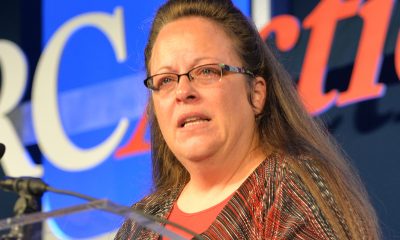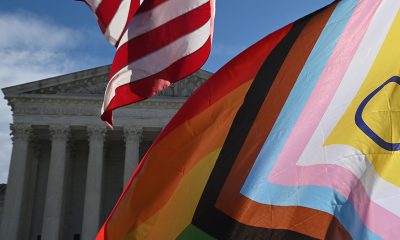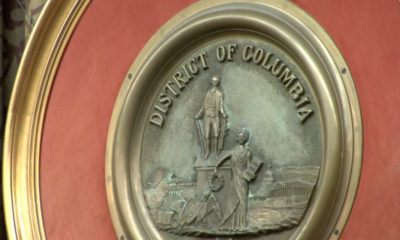News
DOJ touts anti-LGBT views, task force at ‘religious freedom’ summit
Sessions accused of ‘undermining LGBTQ rights’
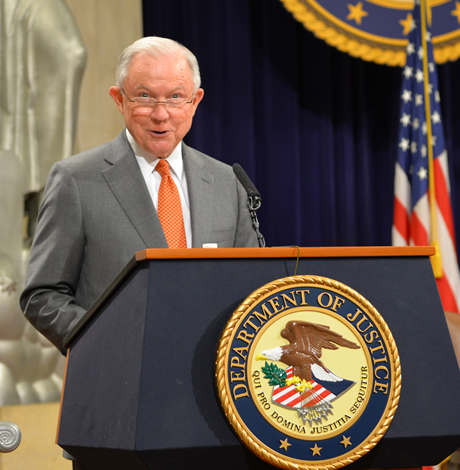
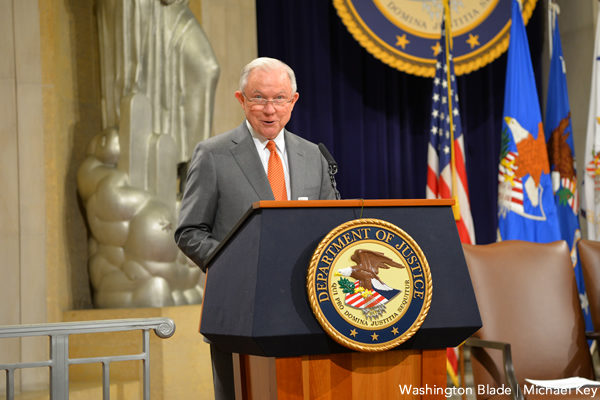
Attorney General Jeff Sessions announced the creation of a Religious Liberty Task Force. (Washington Blade photo by Michael Key)
A summit at the U.S. Justice Department on Monday ostensibly intended to promote religious freedom, including the creation of a Religious Liberty Task Force, often highlighted efforts to enable anti-LGBT discrimination.
At the summit in the Justice Department’s Great Hall, U.S. Attorney General Jeff Sessions announced the creation of the task force to implement “religious freedom” guidance he issued last year.
“The task force will help the department fully implement our religious liberty guidance by ensuring that all Justice Department components — and we got a lot of components around the country — are upholding that guidance in the cases they bring and defend, the arguments they make in court, the policies and regulations they adopt and how we conduct our operations,” Sessions said.
According to the Justice Department, Sessions will serve as chair of the task force, which will be co-chaired by Acting Associate Attorney General Jesse Panuccio and Associate Attorney General for the Office of Legal Policy Beth Williams.
Sessions said a primary mission of the Religious Liberty Task Force will be ensuring Justice Department employees “know their duty is to accommodate people of faith.”
“This administration is animated by the same American view that has led us for 242 years that every American has a right to believe and worship and exercise their faith in the public square,” Sessions added.
The underlying guidance on which the task force is based seeks to allow individuals and businesses to act in the name of religious freedom — often used as an exercise for anti-LGBT discrimination — without fear of government reprisal. Nowhere in the guidance is there a limiting principle assuring the right to free exercise of religion should be an excuse to engage in anti-LGBT discrimination.
Announcing the new task force, Sessions referenced the Masterpiece Cakeshop case in which a Colorado baker was sued after he refused to make a custom-made wedding cake for a same-sex couple. The U.S. Supreme Court narrowly ruled in his favor based on the facts of his case, citing anti-religion sentiment on the Colorado Civil Rights Commission.
Sessions commended Phillips for having endured an “ordeal faced so gravely,” touting an amicus brief the Justice Department filed on his behalf before the Supreme Court. U.S. Solicitor General Noel Francisco also argued in favor of Phillips before justices in oral arguments.
“Let’s be frank: A dangerous movement, undetected by many, but real, is now challenging and eroding our great tradition of religious freedom,” Sessions said at the start of his remarks. “There can be no doubt, it’s no little matter. It must be confronted intellectually and politically, and defeated.”
LGBT rights supporters said in response to the creation of the Religious Liberty Task Force its purpose was to further the Trump administration’s goal of compromising LGBT rights.
Louise Melling, deputy legal director for the American Civil Liberties Union, said the agenda of the Religious Liberty Task Force “isn’t consistent with religious freedom.”
“Religious freedom protects our right to our beliefs, not a right to discriminate or harm others,” Melling said. “Jeff Session’s Department of Justice is again turning that understanding of religious freedom on its head.”
Lucas Acosta, director of LGBTQ media for the Democratic National Committee, said in a statement the task force is “just the latest assault in this administration’s continued campaign against LGBTQ people and our civil rights.”
“By creating this task force, Sessions is establishing a unit dedicated to undermining LGBTQ rights and giving anti-LGBTQ far-right extremists like task force head Jesse Panuccio a taxpayer-funded platform to push their anti-equality agenda,” Acosta said. “Rather than ensuring every person has equal protections and opportunities, Sessions is shamefully doubling down on bigotry.”
But the creation of the Religious Liberty Task Force was just one portion of the summit, which also included the voices of participants who urged a commitment to religious freedom to advance anti-LGBT discrimination.
Archbishop of Louisville Joseph Edward Kurtz, who formerly served as president of the U.S. Conference of Catholic Bishops, said religious freedom is facing challenges that amount to “power-seeking for the purpose of imposing one’s will on others.”
Kurtz cited as an example Catholic adoption agencies being “targeted for closure” for refusing to place children with LGBT families out of religious objections.
“One of the biggest concerns is the ability of our child welfare providers to continue to be able to place children with foster and adoptive families consistent with our teaching,” Kurtz said.
Although no government is actively seeking to close Catholic adoption agencies, they have threatened to shut their doors on their own in the wake of the legalization of same-sex marriage because they feel they’ll be forced to place children with gay couples who marry.
As a result, a growing number or states have enacted anti-LGBT adoption laws allowing taxpayer-funded agencies to refuse to place children with LGBT families over religious objections. House Republicans have inserted an amendment in a pending appropriations bill that would penalize states and localities for having policies barring anti-LGBT discrimination among adoption agencies.
Phillips, the owner of Masterpiece Cakeshop, was himself present at the summit and took part in a panel of individuals who say they are facing challenges to their religious freedom.
Moderating his panel was Justice Department spokesperson Kerri Kupec, formerly a spokesperson for the anti-LGBT Alliance Defending Freedom. At a time when that term is used as justification for anti-LGBT discrimination, Kupec said in her introduction of the panel religious freedom is often “housed in scare quotes, as if it’s not a real thing, or even worse, a bad thing, which is tragic.”
Much of Kupec’s questioning of Phillips sought to elicit sympathy for him, which meant his act of refusing to make a custom-made wedding cake for a same-sex couple who entered his store was glossed over as he explained his commitment to his religious views.
In addition to refusing to make a same-sex wedding cake, Phillips said his religious beliefs compel him to close on Sundays, refuse to service Halloween celebrations or make cakes with denigrating messages.
“It’s the message of the cake that I evaluate, not the person who ordered the cake,” Phillips said. “In one instance, I had a man who wanted me to make a cake basically telling his boss that he was a jerk, so I wouldn’t do that, but I’ve also had people asked me to do cakes that would disparage gay people, the gay lifestyle, but I wouldn’t do that either because they’re hurtful cakes.”
As the litigation went forward, Phillips said he received death threats as well as a threat over the phone against his daughter. As a result, Phillips said he wouldn’t allow employees to answer the phone at Masterpiece Cakeshop and would only take calls himself.
Noting the U.S. Supreme Court only takes a few select cases each year, Phillips became emotional when he recalled news that justices had agreed to take up his petition after the state of Colorado ruled against him.
Even though the result of the case was narrowly in his favor and didn’t open up a First Amendment right for anti-LGBT discrimination, Phillips said it was worth the effort.
“True tolerance has to be a two-way street,” Phillips said. “We’re thrilled that the United States ruled in our favor, this ruling solidifying religious freedom in our country, but it’s not just for me, it’s for all us, every American should now be able to live and work freely and according to their conscience without fear of punishment from the government.”
Other speakers at the summit expressed concerns about threats to religious minorities in a manner that progressives would likely agree is a threat to religious freedom.
Among them was Harpreet Singh, who works with Muslim, Arab, Sikh, South Asian and Hindu religions on behalf of the Justice Department, and Asma Uddin, senior scholar at the Religious Freedom Center of the Freedom Forum Institute, who talked about anti-Muslim sentiments.
Singh said his agency has found hate crimes against minority religions have been increasing, which he said is substantiated by the Federal Bureau of Investigation’s annual reports and studies from universities, although “there’s a lot of underreporting going on.”
But other speakers on the panel railed against efforts to uphold LGBT rights as they face compromise in the name of religious freedom, including Emilie Kao, director of the Richard & Helen DeVos Center for Religion & Civil Society at the anti-LGBT Heritage Foundation.
Kao was critical of litigation filed by the ACLU against the Michigan law enabling Catholic adoption agencies to refuse placement to LGBT families over religious objections.
Asserting same-sex couples seeking to adopt face no problem in access to adoption, Kao said the plaintiff in the lawsuit drove past four other adoption agencies to reach St. Vincent’s Catholic Charities, which she said “still holds the belief that they should put every child with a mother and father.”
“The lesbian couple says they were personally offended by St. Vincent’s not placing a child with them,” Kao said. “I think it’s important for us to recognize that throughout the history of our country and the Supreme Court’s cases, we have always protected the right of people to follow their religious beliefs, and we’ve never protected the right not to have your feelings hurt.”
Michael McConnell, a law professor at the Constitutional Law Center at Stanford University, warned of the growing compromise that religious liberty faces in the wake of growing “sexual freedom.”
“An extremely popular argument in religious circles has been that religious accommodations are necessarily unconstitutional if they lead to so-called third-party harm,” McConnell said. “If there’s anyone whose rights or interests…are interfered with, that that means the accommodation is simply unconstitutional. To my mind, that’s an extremely implausible argument because virtually every accommodation, and indeed, virtually any application of any constitutional right — free speech, property, due process — there’s always someone on the other side of ledger who’s interests are being harmed.”
District of Columbia
Rush reopens after renewing suspended liquor license
Principal owner says he’s working to resolve payroll issue for unpaid staff
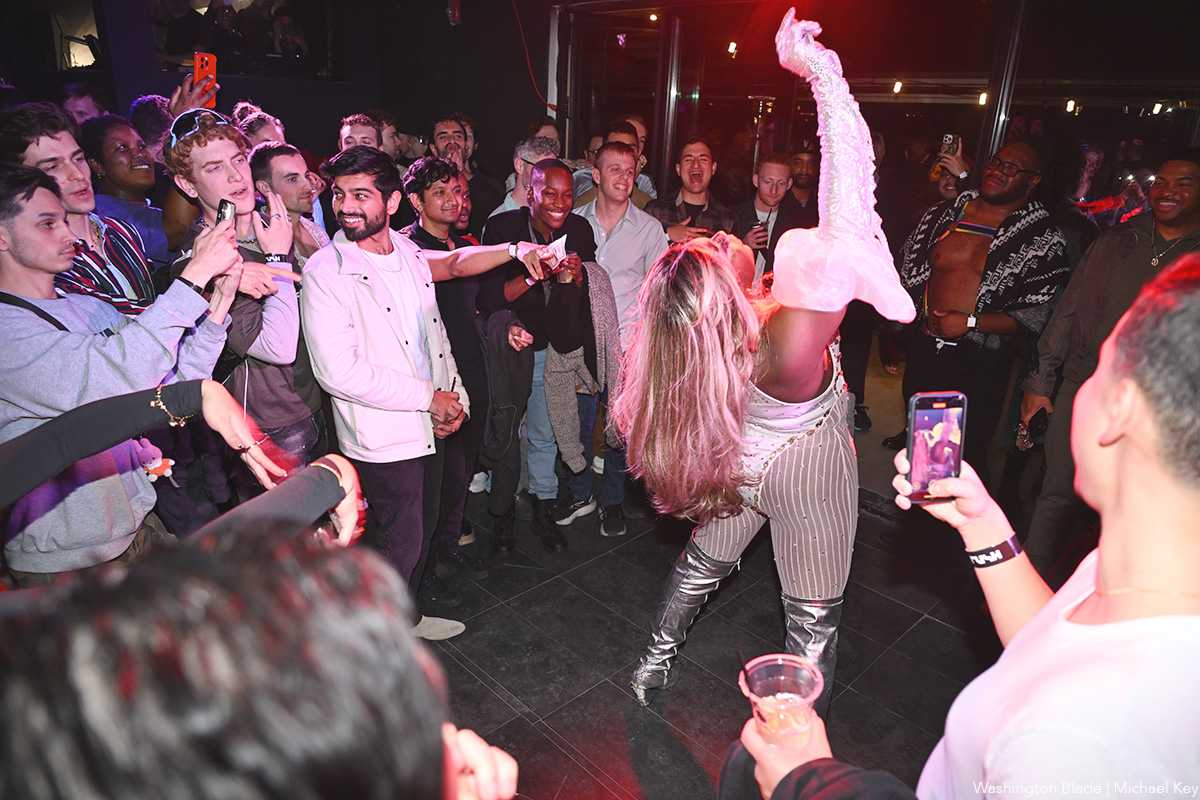
The D.C. LGBTQ bar and nightclub Rush reopened and was serving drinks to customers on Saturday night, Dec. 20, under a renewed liquor license three days after the city’s Alcoholic Beverage and Cannabis Board suspended the license on grounds that Rush failed to pay a required annual licensing fee.
In its Dec. 17 order suspending the Rush liquor license the ABC Board stated the “payment check was returned unpaid and alternative payment was not submitted.”
Jackson Mosley, Rush’s principal owner, says in a statement posted on the Rush website that the check did not “bounce,” as rumors circulating in the community have claimed. He said a decision was made to put a “hold” on the check so that Rush could change its initial decision to submit a payment for the license for three years and instead to pay a lower price for a one-year payment.
“Various fees and fines were added to the amount, making it necessary to replace the stop-payment check in person – a deadline that was Wednesday despite my attempts to delay it due to these circumstances,” Mosley states in his message.
He told the Washington Blade in an interview inside Rush on Saturday night, Dec. 20, that the Alcoholic Beverage and Cannabis Administration (ABCA) quickly processed Rush’s liquor license renewal following his visit to submit a new check.
He also reiterated in the interview some of the details he explained in his Rush website statement regarding a payroll problem that resulted in his employees not being paid for their first month’s work at Rush, which was scheduled to take place Dec. 15 through a direct deposit into the employees’ bank accounts.
Several employees set up a GoFundMe appeal in which they stated they “showed up, worked hard, and were left unpaid after contributing their time, labor, and professional skills to Rush, D.C.’s newest LGBTQ bar.”
In his website statement Mosley says employees were not paid because of a “tax related mismatch between federal and District records,” which, among other things, involves the IRS. He said the IRS was using his former company legal name Green Zebra LLC while D.C. officials are using his current company legal name Rainbow Zebra LLC.
“This discrepancy triggered a compliance hold within our payroll system,” he says in his statement. “The moment I became aware of the issue, I immediately engaged our payroll provider and began working to resolve it,” he wrote.
He added that while he is the founder and CEO of Rush’s parent and management company called Momentux, company investors play a role in making various decisions, and that the investors rather than he control a “syndicated treasury account” that funds and operates the payroll system.
He told the Blade that he and others involved with the company were working hard to resolve the payroll problem as soon as possible.
“Every employee – past or present – will receive the pay they are owed in accordance with D.C. and federal law,” he says in his statement. “That remains my priority.”
In a follow-up text message to the Blade on Sunday night, Dec. 21, Mosley said, “All performers, DJs, etc. have been fully paid.”
He said Rush had 21 employees but “2 were let go for gross misconduct, 2 were let go for misconduct, 1 for moral turpitude, 2 for performance concerns.” He added that all of the remaining 14 employees have returned to work at the time of the reopening on Dec. 20.
Rush held its grand opening on Dec. 5 on the second and third floors of a building at 2001 14th Street, N.W., with its entrance around the corner on U Street next to the existing LGBTQ dance club Bunker.
With at least a half dozen or more LGBTQ bars located within walking distance of Rush in the U Street entertainment corridor, Mosley told the Blade he believes some of the competing LGBTQ bars, which he says believe Rush will take away their customers, may be responsible along with former employees of “rumors” disparaging him and Rush.
India
Few transgender people benefit from India’s low-income housing program
Pradhan Mantri Awas Yojana launched in 2015

The Indian government on Dec. 15 informed parliament that only one transgender person in Jammu and Kashmir has been recorded as a beneficiary under the Pradhan Mantri Awas Yojana since the housing program was launched a decade ago.
PMAY is a federal government program aimed at expanding access to affordable housing for low- and middle-income households, including through credit-linked subsidies. The parliamentary disclosure indicates that trans beneficiaries have been virtually absent from the program’s records in the union territory, despite official guidelines listing trans people as a priority category.
In a written reply to a question in the upper house of parliament, known as the Rajya Sabha, the Housing and Urban Affairs Ministry said Jammu and Kashmir recorded zero trans beneficiaries under the program in each financial year from 2020–2021 through 2025–2026, with the cumulative total since inception remaining at one.
The Indian government launched the program on June 25, 2015, and the Housing and Urban Affairs Ministry implemented it.
The parliamentary reply came in response to a question on whether trans people are being included under the housing scheme and what steps have been taken to address barriers to access. The ministry said both PMAY and its successor, PMAY 2.0, are demand-driven programs, with responsibility for identifying and selecting beneficiaries resting with state and regional governments.
The ministry said the program lists trans people as a priority group, alongside widows, single women, people with disabilities, senior citizens, and other socially disadvantaged categories. It added that actual implementation depends on housing proposals and beneficiary lists submitted by state and regional governments.
According to figures the Indian government cited, a total of 809 trans beneficiaries have been recorded under PMAY and its successor, PMAY 2.0, since the programs were launched, with the vast majority concentrated in a small number of states. The southern state of Tamil Nadu accounts for 222 beneficiaries, followed by Andhra Pradesh with 186, and Odisha with 101. By contrast, several other states and federally administered regions, including Jammu and Kashmir, have reported either negligible or no coverage. India is administratively divided into 28 states and eight federally governed territories.
According to India’s 2011 national Census, Jammu and Kashmir recorded 4,137 trans residents. The same census counted 487,803 trans people nationwide, providing the most recent official population baseline for the community in India.
The ministry also said it has not conducted a specific survey to assess barriers faced by trans communities in accessing the scheme’s benefits. Instead, it said lessons from earlier implementation phases informed the design of the second phase of the program, launched on Sept. 1, 2024, which aims to support an additional 10 million urban beneficiaries over the next five years.
The parliamentary reply reveals an even more severe gap in Ladakh, India’s northernmost federally governed territory bordering China and Pakistan-administered areas and considered strategically critical to national security.
Official records show that Ladakh has not reported a single trans beneficiary under the housing scheme, either in recent years or cumulatively since the program began, with zero coverage recorded across all financial years listed in the Annexure. By comparison, Ladakh’s trans population stands at six, according to a written submission made to the High Court of Jammu and Kashmir in 2024.
Despite trans people being listed as a priority group in the scheme’s guidelines, the federal government said that as of November 2025 it had sanctioned more than 12.2 million homes nationwide under both versions of the program, with over 9.6 million homes completed and delivered. At the same time, data from Jammu and Kashmir, Ladakh, and several other regions show little to no recorded housing uptake by trans beneficiaries.
Speaking with the Washington Blade, Meera Parida, a trans activist, former member of the National Council for Transgender Persons in India’s eastern zone, and a former state advisor under the housing and urban development department, said the 2011 Census does not reflect the full size of India’s trans population, noting that public recognition and self-identification were far more limited at the time. She pointed to later government data collection efforts, including the National Portal for Transgender Persons that the Social Justice and Empowerment Ministry launched in 2020, as evidence that official counts have expanded beyond what was captured in the last Census.
“I am surprised that around the country only over 800 people benefited from the scheme, because most of the transgender population is from socially backward classes,” said Parida. “So they do not have a house and no family. Five years have passed since the NALSA judgment and the Transgender Protection Act; even after all these, if only over 800 transgender persons got home, that is a sad situation.”
Parida said that Prime Minister Narendra Modi has publicly positioned trans people’s welfare as a priority, but argued that the issue requires greater attention at the administrative level. She said the prime minister’s office should issue clear directions to all relevant departments to ensure trans people receive housing support and that implementation moves more quickly.
“There is still widespread discrimination and stigma against the community. Many transgender people are afraid to speak openly, which is why this issue continues to persist,” Parida said. “If stigma and discrimination are not addressed seriously, the marginalized community will remain invisible and reluctant to come forward. In that situation, the government will also be limited in what it can do. State governments should work with activists and community organizations to build accurate data. The government has decided to resume the Census in 2026, but the enumerators who go door to door must be sensitized to engage respectfully with the transgender community. The government should also improve awareness of housing schemes, because many people simply do not know they exist. A single-window system is needed.”
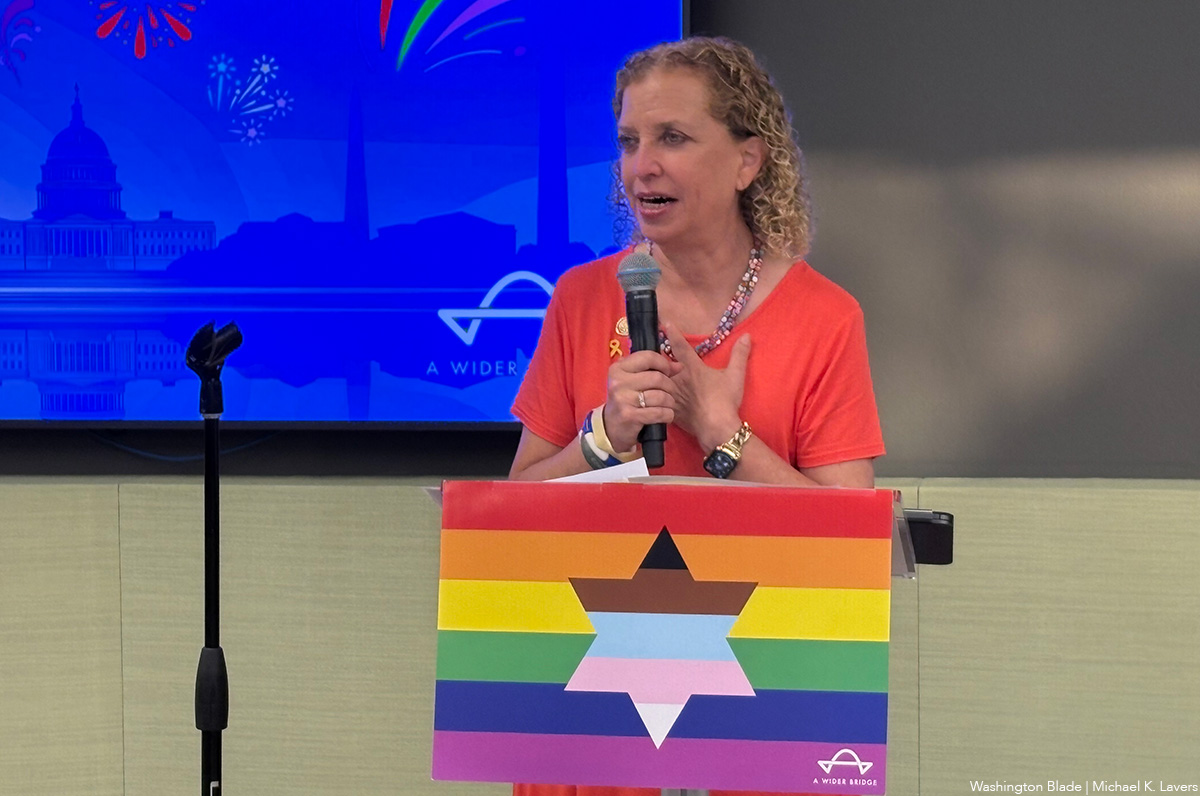
A Wider Bridge on Friday announced it will shut down at the end of the month.
The group that “mobilizes the LGBTQ community to fight antisemitism and support Israel and its LGBTQ community” in a letter to supporters said financial challenges prompted the decision.
“After 15 years of building bridges between LGBTQ communities in North America and Israel, A Wider Bridge has made the difficult decision to wind down operations as of Dec. 31, 2025,” it reads.
“This decision comes after challenging financial realities despite our best efforts to secure sustainable funding. We deeply appreciate our supporters and partners who made this work possible.”
Arthur Slepian founded A Wider Bridge in 2010.
The organization in 2016 organized a reception at the National LGBTQ Task Force’s Creating Change Conference in Chicago that was to have featured to Israeli activists. More than 200 people who protested against A Wider Bridge forced the event’s cancellation.
A Wider Bridge in 2024 urged the Capital Pride Alliance and other Pride organizers to ensure Jewish people can safely participate in their events in response to an increase in antisemitic attacks after Hamas militants attacked Israel on Oct. 7, 2023.
The Jewish Telegraphic Agency reported authorities in Vermont late last year charged Ethan Felson, who was A Wider Bridge’s then-executive director, with lewd and lascivious conduct after alleged sexual misconduct against a museum employee. Rabbi Denise Eger succeeded Felson as A Wider Bridge’s interim executive director.
A Wider Bridge in June honored U.S. Rep. Debbie Wasserman Schultz (D-Fla.) at its Pride event that took place at the Capital Jewish Museum in D.C. The event took place 15 days after a gunman killed two Israeli Embassy employees — Yaron Lischinsky and Sarah Milgrim — as they were leaving an event at the museum.
“Though we are winding down, this is not a time to back down. We recognize the deep importance of our mission and work amid attacks on Jewish people and LGBTQ people – and LGBTQ Jews at the intersection,” said A Wider Bridge in its letter. “Our board members remain committed to showing up in their individual capacities to represent queer Jews across diverse spaces — and we know our partners and supporters will continue to do the same.”
Editor’s note: Washington Blade International News Editor Michael K. Lavers traveled to Israel and Palestine with A Wider Bridge in 2016.
-

 Opinions5 days ago
Opinions5 days ago2026 elections will bring major changes to D.C. government
-

 Kazakhstan5 days ago
Kazakhstan5 days agoKazakh Senate approves anti-LGBTQ propaganda bill
-

 District of Columbia4 days ago
District of Columbia4 days agoNew queer bar Rush beset by troubles; liquor license suspended
-

 Letter-to-the-Editor5 days ago
Letter-to-the-Editor5 days agoCandidates should pledge to nominate LGBTQ judge to Supreme Court

